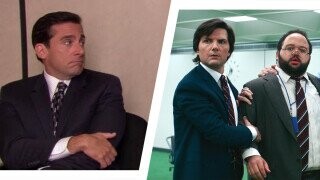‘The Office’ v. ‘Severance’ in Terms of Dystopian Portrayal of the Workplace

Because the American TV viewing public is made up of a bunch of sadists, a lot of people spend their precious free time watching fictional people work in fake office buildings. Obviously, there’s The Office, the mockumentary about a small paper company/one man’s unhealthy urge to psychologically decimate a moderately annoying co-worker. But also, last year, we got another show about the existential ennui of office life: Severance.
Sure, Severance is set in a future world where workers can “sever” their consciousness, living distinctly separate lives: the one that exists at home, and the one that’s only ever aware of their working life. But is life working for Lumon Industries that much more dystopian than one spent hawking paper products for Dunder Mifflin? We’ve decided to pit these two shows against each other in several different categories to find out which workplace is more disquietingly nightmarish, once and for all.
The Job
Don't Miss
At Lumon, employees are tasked with sorting a bunch of seemingly random numbers on vintage computers that, for some unknown reason, provoke an emotional response.
Which is… unusual. But for all these guys know, this baffling procedure is helping to battle alien invaders or cure some terrible disease. At Dunder Mifflin, on the other hand, everyone is well aware that they’re working in an industry that is, depressingly, in a state of steady decline. And at no point has anyone at Lumon been asked to use an unwieldy, triangular-shaped tablet.
Most Dystopian: The Office
Office Space
Both physical office spaces have bad fluorescent lighting and cramped desks — although at least Dunder Mifflin has a few windows. Obviously, in Severance, no one is allowed to leave the office — and if they try, their “outie” takes control and forces them back in.
But even though they have more free will, The Office characters rarely elect to leave the building for breaks, save for the odd lunch. And they even suggest in one episode that prison sounds favorable compared to their day-to-day lives, prompting a visit from “Prison Mike.”
While Dunder Mifflin is very confined, Lumon’s sparse employment allows the characters far more space, and the improbably far-reaching labyrinth of hallways is perfect for long walks. Sometimes you might even stumble upon a room that’s inexplicably filled with baby goats.
Sure Lumon’s offices are surveilled at all times, and the employees treated like common insects — but the folks at Dunder Mifflin were also being filmed by a documentary crew, who even brought cameras into the men’s room at one point.
Most Dystopian: Tie
The Management
Michael Scott was obviously a painfully awkward boss most of the time — not to mention the time he literally hit Meredith with his car.
Dunder Mifflin's CEOs and assorted corporate executives ranged from comically inept to wildly unhinged. In Severance, though, the higher-ups are explicitly villainous. And even when they’re acting nice, it’s creepy as hell. Plus, there’s the whole torture thing.
Most Dystopian: Severance
Social Gatherings
Dunder Mifflin threw its fair share of parties, but so does Lumon — and while the former’s shindigs were usually pretty dull, with no music and the same terrible office lighting, the severed workers are routinely treated to dance parties with colorful lighting and groovy tunes, that only occasionally go horribly, violently wrong.
But is this really that much more alienating than anything that happened on the booze cruise? Or the launch party that ended with Michael holding a teenage delivery guy hostage?
And we can’t recall a single instance when Dunder Mifflin went out of their way to invite an employee for a private waffle party/masked orgy.
Most Dystopian: The Office
So, according to this unimpeachable rubric, The Office wins/loses. Sure, the Severance characters are literally trapped — but the fact that the Office gang are not physically bound to their workplace, yet still elect to return there, day in and day out, to perform increasingly irrelevant tasks for a meager salary is perhaps more symptomatic of an unjustly broken society than anything we see in Severance. And we haven’t even mentioned The Office’s impending climate-related apocalypse…
You (yes, you) should follow JM on Twitter (if it still exists by the time you’re reading this).